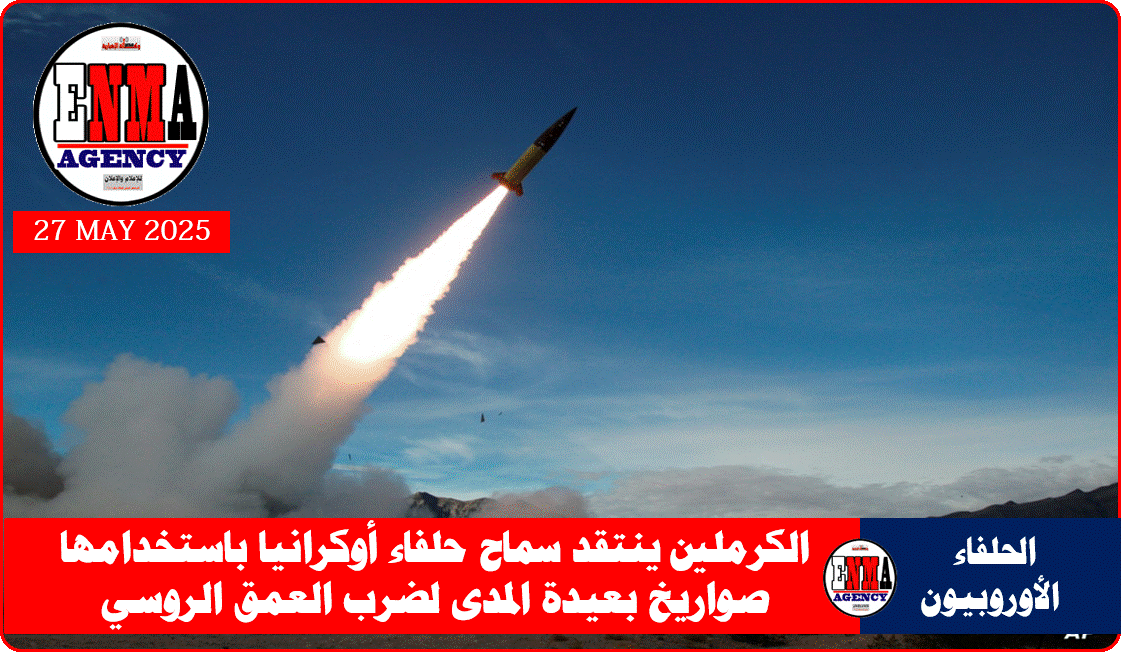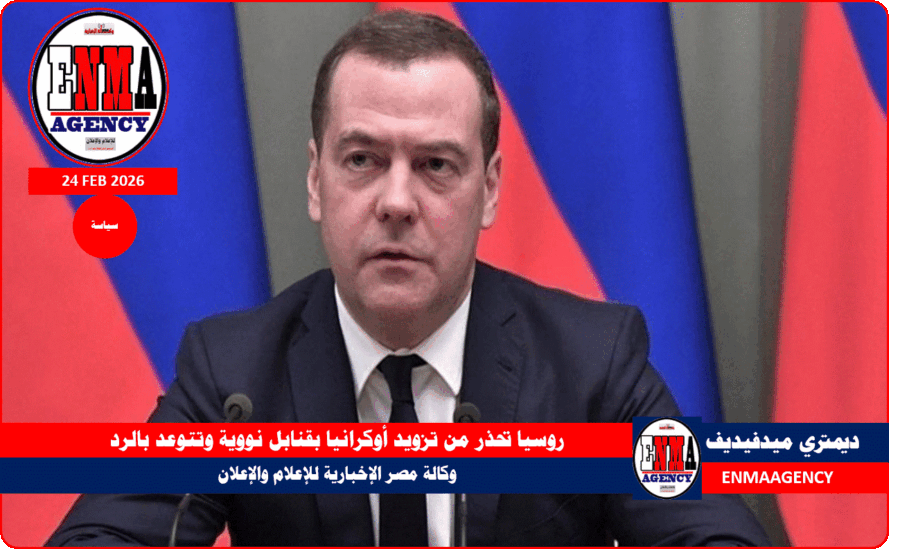الكرملين ينتقد سماح حلفاء أوكرانيا باستخدامها صواريخ بعيدة المدى لضرب العمق الروسي

الكرملين ينتقد سماح حلفاء أوكرانيا باستخدامها صواريخ بعيدة المدى لضرب العمق الروسي
وكالة مصر الإخبارية للإعلام والإعلان| الثلاثاء 27 مايو 2025م
انتقد الكرملين القرار الذي وصفه بـ”الخطير” الذي اتخذه حلفاء أوكرانيا برفع الحظر المفروض على إطلاق كييف صواريخ بعيدة المدى على روسيا، وذلك بعد أن قال المستشار الألماني فريدريش ميرز، إنه لم تعد هناك أي قيود على مدى الأسلحة التي يقدمها الغرب.

وفي تصريحات بعد أيام من قصف روسيا العاصمة الأوكرانية ومناطق أخرى بهجمات جوية مكثفة، قال المستشار الألماني، الاثنين، إن بلاده وحلفاء آخرين رفعوا القيود على مدى استخدام الأسلحة.
وقال ميرز خلال فعالية نظمتها هيئة الإذاعة والتلفزيون الألمانية العامة WDR: “لم تعد هناك أي قيود على مدى الأسلحة الموردة إلى أوكرانيا. لا من البريطانيين، ولا من الفرنسيين، ولا منا. ولا من الأمريكيين”.
وأوضح ميرز: “بعبارة أخرى، يمكن لأوكرانيا الآن الدفاع عن نفسها، حتى من خلال مهاجمة مواقع عسكرية في روسيا، فهي على سبيل المثال. لم تكن قادرة على القيام بذلك حتى بعض الوقت. وباستثناءات قليلة جدا، لم تكن قادرة على ذلك”.
وبعد أن تم تفسير تصريحاته على أنها إعلان عن سياسة جديدة، قال ميرز إن هذا “الوضع قائم منذ أشهر”.
وفي المقابل، انتقد المتحدث باسم الكرملين، دميتري بيسكوف، إعلان ميرز، الاثنين، وقال إن رفع القيود “خطير للغاية”، بحسب وكالة “تاس” الروسية الرسمية للأنباء.
وقال بيسكوف وفقا لوكالة “تاس”: “إذا اتُخذت مثل هذه القرارات، فإنها ستتعارض تماما مع تطلعاتنا للتوصل إلى تسوية سياسية والجهود المبذولة في إطار تلك التسوية”.
وسبق أن هددت روسيا بشكل علني بأن أي رفع للقيود على الأسلحة بعيدة المدى سيعني حربا مع حلف شمال الأطلسي “الناتو”.
وحذر الرئيس الروسي، فلاديمير بوتين الغرب من أن موسكو ستعتبر أي هجوم تدعمه قوة نووية هجوما مشتركا، وأن روسيا قد تستخدم الأسلحة النووية إذا تعرضت لهجوم بصواريخ تقليدية.
وشكل التهديد باستخدام الأسلحة النووية تصعيدا كبيرا في خطاب الكرملين، على الرغم من أنه لم يتصرف بناء على هذا التهديد بمجرد أن بدأت كييف باستخدام صواريخ بريطانية وأمريكية الصنع لضرب عمق الأراضي الروسية.
وكان حلفاء أوكرانيا الرئيسيون قاوموا في الماضي مطالب أوكرانيا باستخدام أسلحة غربية لضرب العمق الروسي. وتغير هذا الوضع في أواخر العام الماضي، عندما أعطى الرئيس الأمريكي السابق، جو بايدن الضوء الأخضر لأوكرانيا لاستخدام أنظمة الصواريخ التكتيكية بعيدة المدى الأمريكية ATACMS، داخل روسيا.
لكن هذا القرار أيضا كان مثيرا للجدل، واستغرق شهورا من النقاش لاتخاذه. حتى أن الولايات المتحدة رفضت تزويد أوكرانيا بأنظمة صواريخ ATACMS خلال أول عامين من الحرب، ولم يتم تسليم الصواريخ لأول مرة إلا في أبريل/نيسان 2024. وأعرب بعض المسؤولين الأمريكيين عن قلقهم من تصعيد الحرب، التي دخلت الآن عامها الرابع، في حين أبدى آخرون مخاوفهم من تضاؤل مخزونات “البنتاغون” من الأسلحة.
ومن المتوقع أن يزور الرئيس الأوكراني، فولوديمير زيلينسكي برلين، الأربعاء، بحسب ما نقلته وكالة “رويترز” عن عدة مصادر.
وأسفرت هجمات روسيا خلال عطلة نهاية الأسبوع عن مقتل أكثر من عشرين شخصا، بينهم أطفال، في حين دعت أوكرانيا حلفاءها الغربيين لمواصلة الضغط على موسكو لإنهاء الحرب.
وقال زيلينسكي، الأحد: ” لا يمكن وقف هذه الوحشية دون ضغط قوي بالفعل على القيادة الروسية”.
ومن جانبه، عبر الرئيس الأمريكي، دونالد ترامب، الاثنين، عن إحباطه المتزايد من بوتين، وقال إن الزعيم الروسي “أصبح مجنونا تماما“، كما انتقد أيضا تصريحات زيلينسكي ووصفها بأنها تسبب “مشاكل”.
ويتزايد الضغط أيضا من داخل قاعدة ترامب الجمهورية، إذ حث عدد من أعضاء الكونغرس – بمن فيهم السيناتور تشاك غراسلي والسيناتور ليندسي غراهام، والنائبان برايان فيتزباتريك ودون باكون- الرئيس ترامب على فرض عقوبات صارمة على روسيا.
وكتب باكون على منصة “إكس”: “حان وقت الصدق. محادثات السلام لا تؤثر على بوتين إطلاقا. يجب على الولايات المتحدة والحلفاء تسليح أوكرانيا بكل قوة”.
المصدر: مواقع ووكالات منها نعيد النشر ونحفظ حق الناشر بالإشارة وامكانية الوصول
AI TRANSLATE DEEP SEEK
Kremlin Condemns “Dangerous” Decision by Ukraine’s Allies to Lift Restrictions on Long-Range Strikes Against
Russia

The Kremlin has criticized what it called a “dangerous” decision by Ukraine’s allies to lift restrictions on Kyiv’s use of long-range missiles against Russian territory. The condemnation came after German Chancellor Friedrich Merz stated on Monday that Western nations, including Germany, no longer impose limits on the range of weapons supplied to Ukraine.
Speaking days after Russia launched intense airstrikes on Ukraine’s capital and other regions, Merz clarified during an event organized by German public broadcaster WDR: “There are no longer any restrictions on the range of weapons delivered to Ukraine—not from the British, the French, us, or the Americans.” He emphasized, “Ukraine can now defend itself, including by attacking military sites inside Russia, which it was largely unable to do until recently.”
Merz later clarified that this policy shift had been in place “for months,” countering interpretations that his remarks signaled a new development.
In response, Kremlin spokesperson Dmitry Peskov denounced Merz’s announcement as “extremely dangerous,” according to Russia’s official TASS news agency. Peskov warned that such decisions “directly contradict efforts toward a political settlement” of the conflict. Russia has repeatedly threatened that lifting restrictions on long-range weapons would escalate the war into a direct confrontation with NATO.
Russian President Vladimir Putin has also cautioned the West that Moscow would consider any attack backed by a nuclear power as a joint assault, potentially triggering a nuclear response even to conventional missile strikes. While these threats marked a significant escalation in rhetoric, Russia has not acted on them despite Ukraine’s use of British- and U.S.-made missiles to strike deep inside Russian territory.
Shifting Western Policies
Ukraine’s key allies initially resisted allowing Kyiv to use Western-supplied arms to target Russian soil. This stance shifted late last year when former U.S. President Joe Biden authorized Ukraine to deploy American-made ATACMS tactical missile systems against Russia. However, the decision followed months of internal debate, with some U.S. officials expressing concerns over escalation and dwindling Pentagon stockpiles. The U.S. had refused to provide ATACMS during the first two years of the war, only delivering the missiles in April 2024.
Zelenskyy’s Visit and Escalating Tensions
Ukrainian President Volodymyr Zelenskyy is expected to visit Berlin on Wednesday, according to Reuters sources. The trip comes amid heightened tensions following Russian weekend attacks that killed over 20 people, including children. Zelenskyy urged Western allies on Sunday to maintain pressure on Moscow, stating, “This brutality cannot be stopped without strong, sustained pressure on Russia’s leadership.”
U.S. Political Pressures
Meanwhile, former U.S. President Donald Trump voiced growing frustration with Putin on Monday, calling the Russian leader “completely deranged” and criticizing Zelenskyy’s rhetoric as “problematic.” Pressure is also mounting within Trump’s Republican base, with several lawmakers—including Senators Chuck Grassley and Lindsey Graham, and Representatives Brian Fitzpatrick and Don Bacon—urging stricter sanctions on Russia. Bacon wrote on X: “It’s time for honesty. Peace talks don’t faze Putin at all. The U.S. and allies must fully arm Ukraine.”
Note: The article reflects evolving Western support for Ukraine amid Russia’s ongoing invasion, nuclear posturing, and internal political dynamics in the U.S.






